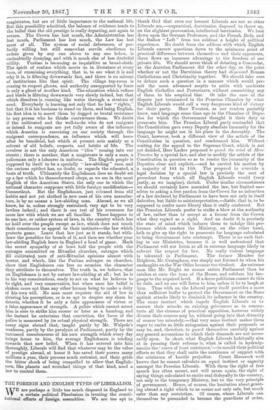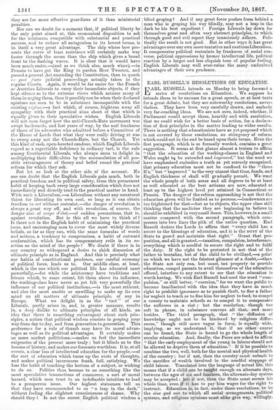THE FOREIGN AND ENGLISH TYPES OF LIBERALISM.
\ATE are perhaps a little too much disposed in England to T a certain political Pharisaism in treating the consti- tutional efforts of foreign assemblies. We are too apt to thank God that even our keenest Liberals are not as other Liberals are,—unpractical, doctrinaire, disposed to throw up, on the slightest provocation, intellectual barricades. We look down upon the German Professors, and the French Reds, and the Italian " Left " from too sublime a height of political experience. No doubt from the address with which English Liberals narrow questions down to the minimum point of practical difference between themselves and their opponents, there flows an immense advantage to the freedom of our private life. We should never think of debating a Concordat, as the Austrian Parliament did the other day, on the point whether or not the Darwinian theory had disproved Roman Catholicism and Christianity together. We should take care to debate such a question in a manner which would per- mit the most advanced sceptic to unite with moderate English Catholics and Protestants, without committing any of them to his sceptical bias. Or take the case of the dispute just terminated in the Prussian Chamber by what English Liberals would call a very dangerous kind of victory for their party. Herr Twesten, as our readers probably know, used language some time ago in the Chamber of Depu- ties for which the Government thought it their duty to prosecute him. The Prussian Liberal party contended that the Constitution gave every Deputy absolute immunity for the language he might use in his place in the Assembly. The Court, however, took a different view of the article of the Constitution in question, and condemned him. Without waiting for the appeal to the Supreme Court, which is not yet decided, Herr Lasker proposed to quash the trial of Her Twesten by a special law, and also to modify the article of the Constitution in question so as to render the immunity of the Deputies clear and explicit,—and he carried his motion by a majority of 181 to 160. The proposal to override a legal decision by a special law is precisely the sort of precedent from which all English Liberals would (very justly, as we imagine), shrink. Under similar circumstances we should certainly have amended the law, but limited our- selves to asking a free pardon from the Crown for an infraction of a law declared by Parliament to have been not only in itself defective, but liable to misinterpretation,—liable, that is, to be supposed to confer more liberty than it really conferred. But the Prassian Liberals prefer to strike a blow at the authority of law, rather than to accept as a favour from the Crown what they regard as a right. And no doubt it is precisely the state of mind which induces them to indulge this pre- ference which renders the Ministry, on the other hand, loth to give up the right to prosecute for language calculated to bring Government into contempt. There is no such feel- ing in our Ministries, because it is well understood that Parliament will not listen at all to extreme language likely to subvert the respect for law. No really violent language is tolerated in Parliament. The former Member for Brighton, Mr. Coningham, was simply not listened to when his onslaughts on the War Office became too virulent. An extreme man like Mr. Bright no sooner enters Parliament than he catches at once the tone of the House, and subdues his lan- guage to the required level. If a fierce politician cannot do this he fails, and no one will listen to him, unless it be to laugh at him. Thus with us, the Liberal party itself provides a more than sufficient buffer to protect the Government or the State against attacks likely to diminish its influence in the country. The same instinct which impels English Liberals so to narrow their attacks on existing grievances as to concen- trate all the streams of practical opposition, however widely diverse their sources may be, without going into that diversity of source too minutely,—that very same instinct makes them eager to excite as little antagonism against their proposals as may be, and, therefore, to guard themselves carefully against any general accusations to which their demands are not neces- sarily open. In short, what English Liberals habitually aim at in pressing their reforms is, what is called in hydrody- namics the curve of least resistance,'—to mould their political efforts so that they shall unite the maximum of support with the minimum of hostile prejudice. Count Bismarck well knows that he cannot calculate on equal instinct or sagacity amongst the Prussian Liberals. With them the right of free speech has often meant, and will mean again, the right of saying things calculated to excite real disloyalty in the country, not only to the temporary Ministry, but to the very principle of government. Hence, of course, the hesitation about grant- ing abroad a right which to us seems not only safe, but much safer than any restriction. Of course, where Liberals can themselves be persuaded to become the guardians of order, they are far more effective guardians. of it than ministerial penalties. Nor can we doubt for a moment that, if political liberty be the only point aimed at, this economical disposition to ask for the minimum compatible with substantial and practical success, and to reduce all antagonism to its lowest terms, is in itself a. very great advantage. The ship whose bow pre- sents the curve of least resistance will certainly make way faster through the ocean than the ship which gives a broad front to the dashing waves. It is clear that it would have been much easier,—(and as we think also, much wiser),—in Prussia to have got the King to pardon Herr Twesten, and passed a general Act amending the Constitution, than to quash er post facto judicial proceedings actually taken in tha regular Courts. Again, it would be far easier for the French or Austrian Liberals to carry their immediate objects, if they kept silence as to the extreme views which actuate many of them in urging them, than it possiblycan be when their declared opinions are seen to be in substance incompatible with the existing rejime,—a fact which, of course, frightens away all sympathy with their practical aims short of that which is equally given to their speculative wishes. English Liberals will not soon forget how the anti-Church-Rate movement was swept backwards, and lost years of way, by the nag frankness of those of its advocates who admitted before a Committee of the House of Lords that what they were really driving at was to sweep away not the Church-Rate, but the Church. Yet this kind of rash, open-hearted candour, which English Liberals regard as a regrettable deficiency in ordinary tact, is the rule among Continental Liberals, who always seem to delight in multiplying their difficulties by the accumulation of all pos- sible extravagances of theory and belief round the practical reform for which they ask.
But let us look at the other side of the account. No one can doubt that the English Liberals gain much, both in practical freedom and in political safety, -from this permanent habit of keeping back every large consideration which does not immediately and directly tend to the practical matter in hand. With such a Liberalism,—a Liberalism without any unnatural thirst for liberating its own soul, so long as it can obtain freedom to act without restraint,—the danger of revolution is always a great way off, and with revolution, of course, the danger also of coups d'ettat,—of sudden precautions, that is, against revolution. But is this all we have to think of ? Is there not in the English habit of. minimizing the practical issue, and encouraging men to cover the most widely diverse beliefs, so far as they can, with the same formulas of words and actions, a tendency to compromises, a habit of outward conformities, which has its compensatory evils in its re- action on the mind of the people ? We doubt if there is in any country so widespread a desire to shirk discussion of ultimate principle as in England.. And this is precisely what our habits of constitutional prudence, our careful economy of political force, leads us to. Our middle class, at least, which is the one which our political life has educated most powerfully,—for while the aristocracy have traditions and leisure which, to some extent, lift them above its influence, the working-class have never as yet felt very powerfully the influence of our political institutions,—is the most reticent, and also the most unable or unwilling to make up its own mind on all matters of ultimate principle, of any in Europe. What we delight in as the " tact " of our Liberals, partly arises in, and, in greater measure, results in, a deep dislike to ultimate principles of all kinds, an idea that there is something extravagant about such prin- ciples, a notion that political wisdom consists in groping your way from day to day, and from generation to generation. This preference for a rule of thumb may have its moral advan- tages as well as its political advantages. It certainly makes us more modest politicians,—makes us feel the immediate exigencies of the present more truly ; but it blinds us to the lessons of history, and makes our forecasts worthless. It is, at all events, a clear loss of intellectual education for the people,—of the sort of education which tarns up the roots of thoughts, and makes political intercourse frank, full, satisfying. We lose the habit of touching the bottom of a subject, or wishing to do so. Politics thus become to us something like the most speculative transactions of commerce, a sort of moral hazard, which men trust to an indefinable intuition to lead to a prosperous issue. Our highest statesmen tell us that they have recommended to us " a leap in the dark," without feeling the slightest consciousness of shame. Why should they ? Is not the surest English political wisdom a Iblind groping ? And if any great force pushes from behind a man who is groping his way blindly, may not a leap in the dark be his best expedient?? Foreign Liberals lay down for themselves great and often very abstract principles, to which through good and evil report they tenaciously adhere. Poli- tically the result is not good. But in other ways it has great advantages over our own more tentative and cautiousLiberalism. It compensates political restraints by frankness of social con- verse, political oppressions by keener intellectual life, political reaction by a larger and less cliquish tone of popular feeling. English Liberals may well over-value the many undoubted advantages of their own prudence.



































 Previous page
Previous page